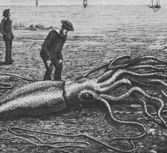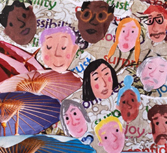
HONR 200-01: Invertebrate Neurobiology [4256]
Instructor: Chan Lin, Honors College
Mon. 4:30-7:00pm
Honors College Seminar Room [LIB 216M]
Understanding how the brain works is one of the biggest challenges in science. In recent years, the development of neuroscience has drawn unprecedented resources and efforts worldwide; however, we are still awaiting an overarching theory regarding how any brain actually works. This seminar will introduce you to a range of historical and modern neuroscience topics, from the squid giant axon’s action potentials to jellyfish biofluorescence, with a focus on the roles invertebrates play as critical research animals. As well, we will focus on the some of the greatest discoveries in neuroscience, many of which are Nobel Prize-winning stories.

HONR 200-02: Hollywood’s Civil War [6741]
Instructor: Jeremy Spahr, Honors College
Tues./Thurs. 10:00-11:15am
Honors College Seminar Room [LIB 216M]
The course will combine a historical overview of the American Civil War and
Reconstruction with an examination of how those topics have been portrayed in American cinema. In particular, it will emphasize the complicated and contested nature of historical memory and how the varied cinematic portrayals of this time period reflect changing social and cultural trends in American society. This course will help students recognize the ideological messages, as well as the complicated and contested nature of historical memory in popular culture portrayals of historical events.

HONR 200-03: Disasters That Shaped US [6742]
Instructor: Gary Williams, Emergency Health Services
Wed. 4:30-7:00 pm
Honors College Seminar Room [LIB 216M]
This course will explore ten different disasters that have occurred around the world, leaving an undeniable impact on societies, cultures, and the environment. Through a multidisciplinary approach, students will dive into the impacts and responses to these crises – such as the 2010 Haiti earthquake, the 2011 Fukushima disaster, and the 2014 West African Ebola outbreak – in order to gain better insight into the ways these tragedies have shaped the course of human history. These topics will include technology, healthcare access, public health emergencies, and even criminal events to help students recognize the inhumane situations that people faced because of the
disaster itself and, at times, human error. Finally, students will analyze the changes that were made because of these events in hopes to avoid or at least mitigate such disasters in the future.

HONR 300-01: Facts and Fiction of Exercise [3498]
Instructors: Sarah Leupen, Biological Sciences
Mon./Wed. 10:00-11:15am
ILSB 230
Most people these days are interested in such questions as, “Is sitting actually bad? “Is running natural for humans or did we evolve this way?” and “Why do I hate exercise when it’s so good for me?” As a foundation, we will utilize theories and analysis from disciplines such as sociology, anthropology, history, and evolution; in addition, since most of us have life experiences that relate to all these things, part of the course “material” will be exercise itself (or related accommodations) and reflection, giving the students a common experience informed by their own disciplinary perspectives. The goal is not to turn anyone into an exercise junkie but to create awareness of the facts, fiction, and outright falsehoods surrounding exercise in our society.
HONR 300-02: Race, Proverty, and Gender in Baltimore [3499]
Instructor: Jodi Kelber-Kaye, Honors College
Wed. 1:00-3:30pm
Honors College Seminar Room [LIB 216M]
Social categories of race, class and gender provide structure for and organize people’s lives. These categories intersect with one another, reinforce one another’s effects, and can, at the same time, cut against one another. In this course, we will explore how these main social categories operate in the lives of people living (or who lived) in Baltimore. We will first explore how race, class, poverty, and gender are defined and then examine how they operate and interact within the context of Baltimore. As any city with a unique history, Baltimore provides a location through which we can examine social phenomena like block busting (neighborhood segregation), health disparities, food access, proliferation of crime and drugs, the judicial system, and more. Students will be engaged with projects in Baltimore. Some short papers and a longer final presentation/paper that incorporates the Baltimore work will be required.

HONR 300-03: Shakespear and Free Will [XXXX]
Instructor: Greg Ealick, Philosophy
Tu./Th. 10:00-11:15am
PAHB 456
Whether we are free is an important question. Human decisions, relationships, and actions all seem to take on special value because we choose them; conversely, these things may appear to lose value if chosen for us. In this class, we will use Shakespeare to explore two different strategies for analyzing what comes with free will – or lack thereof. First, we will interrogate Shakespeare’s own position on free will, and second, we will use Shakespearean resources (such as his plays, how he portrays the human condition, and his knack for
metaphor) to come to a contemporary and personal understanding of free will and determinism. While the medium is literature, the issues we will discuss pertain to disciplines such physics, theology, neurology, political science, psychology, history, anthropology, and economics.

HONR 300-04: Be Your Best Self in Real Life [3940]
Instructors: David Hoffman and Tess McRae, Center for Democracy and Civic Life
Tu. 4:30-7:00pm
Honors College Seminar Room [LIB 216M]
This course investigates institutions and the ways they can suppress or liberate people’s agency: the capacity to make choices and shape our world. Students will develop a sophisticated understanding of how people can become agents in three key institutional realms: education, employment, and civic life.

HONR 300-05: Material Performance in Star Wars [4013]
Instructors: Colette Searls, Theater
Tu./Th. 11:30-12:45pm
Meyerhoff 256
Star Wars, the most popular, written-about film franchise in history, teems with puppets, masks, and costume-creatures that have remained iconic for nearly half a century. In this seminar, we’ll examine how material characters like Yoda, Darth Vader, the droids pose question about contemporary issues like technophobia, human-material relationships, and other-ness. We will
inform our discussions with research into the larger context of American puppet emergence during the last quarter of the 20th Century, including a look at Jim Henson’ Muppets, and conclude with our own experiential play with material performance.

HONR 300-06: Community Engaged Writing [4133]
Instructors: Elaine MacDougall, Academic Success Center
Tu/Th. 8:30-9:45am
Meyerhoff 256
This seminar focuses on a frequently ignored segment of the population: the incarcerated. Students will be challenged to analyze prison writing by authors both inside and outside the walls in order to critically engage with counter story in prison narratives; in addition, they will be asked to question systemic inequalities that lead to incarceration in the first place. Finally, as a capstone activity, students will research and assess a Maryland-based organization that was founded around issues such as recidivism, re-entry, and/or prison education projects in order to better understand initiatives happening in local communities. Instead of being lecture-based, this course will allow the students to co-create the breadth of topics discussed and lead discussions on the material.
Note: This course will also count as an AP English Replacement course for the Honors College
requirement
12/5/23